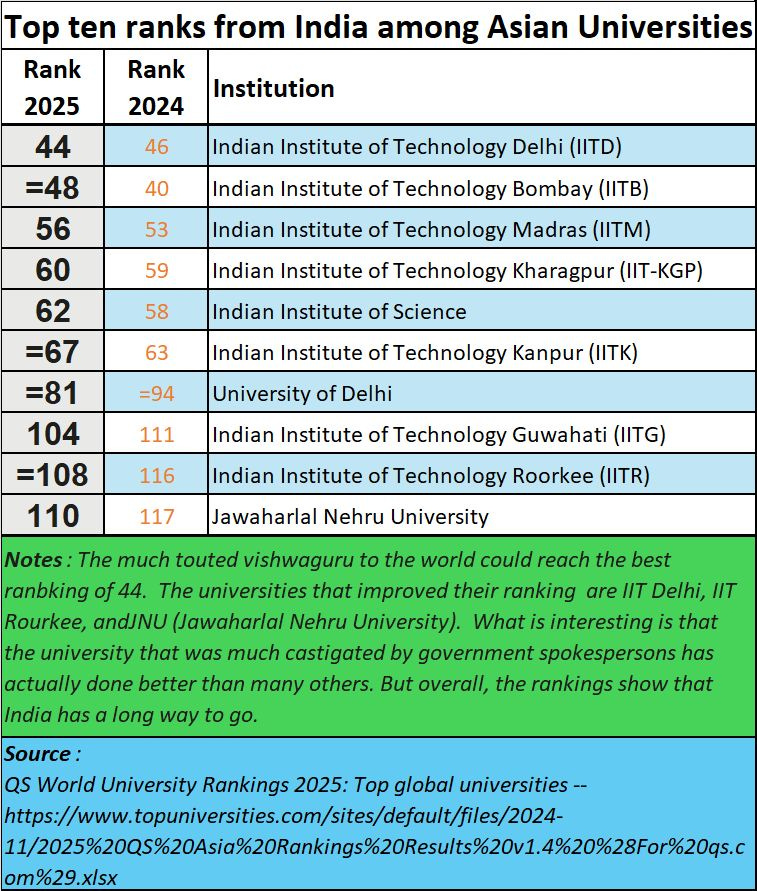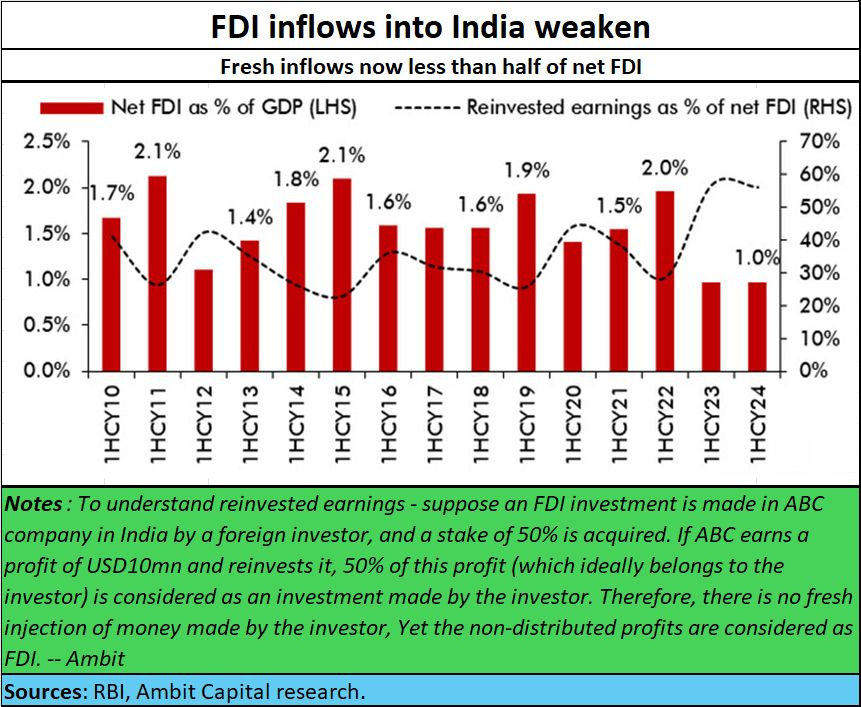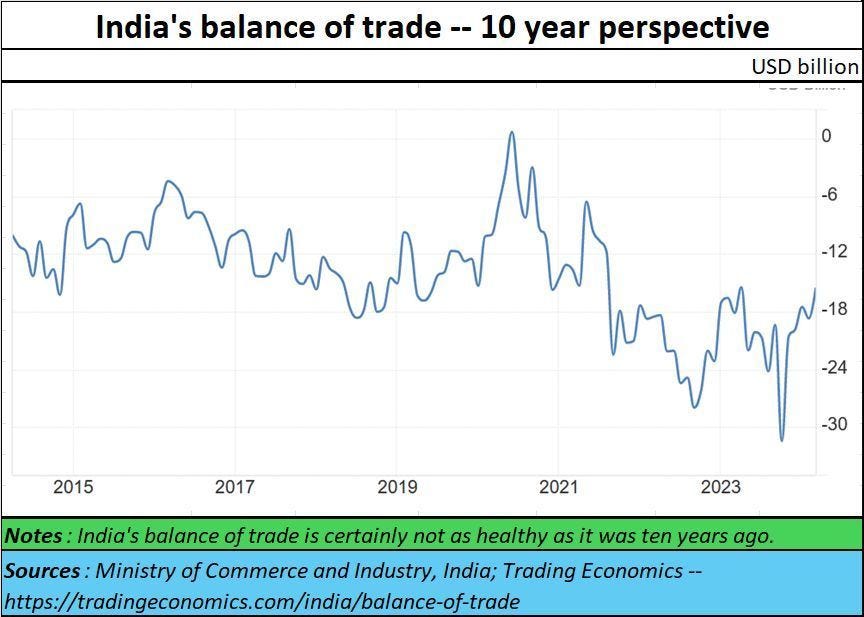Policy Watch
Last week, at a Business Standard conference, RBI governor, Shaktikanta Das made some observations that caused many observers to roll back their eyes. The governor said that the Indian economy and the financial sector were well placed to deal with any spillover impact from the global economy (https://www.business-standard.com/opinion/editorial/policy-approach-how-rbi-is-taking-a-selective-and-cautious-stance-124110701932_1.html). He obviously did not say a word about how ideology was beginning to hurt India.
But the view from the street is hardly comforting. The poor man has been left out in the cold. Inflation has pulverised the poor – no matter what statistics the RBI churns out. The middle class is feeling squeezed (Free subscription -- https://bhaskarr.substack.com/p/the-shrinking-growth-of-the-middle). The number of poor remains undiminished, even though Niti Aayog has worked out an unusual compilation of numbers (https://asiaconverge.com/2023/07/eliminating-poverty-the-india-way/ and https://asiaconverge.com/2024/10/the-mask-is-slippimaskng/).
Yes, India has built large foreign exchange reserves, which will help tame excess volatility in the currency market. But then the collapsing rupee does raise questions. Is it the RBI’s ineptness, or is it the management of the Indian economy? One does not expect the governor to make any candid statements about the management of the country, but the numbers that keep pouring in – not directly from government sources but from savvy analysts – suggest that there is a lot that is not going right.
The governor said that India will benefit by avoiding currency overvaluation. The past decade has shown that each time the rupee weakens, importing countries squeeze Indian prices further. Unfortunately, Indian continues to hanker after western buyers, when the bigger opportunities – and growth – lie in the East (Free subscription -- https://bhaskarr.substack.com/p/india-china-and-russia-could-be-dancing). India’s role in the BRICS meet at Kazan in Russia also showed how its role had got diminished considerably (Free subscription -- https://bhaskarr.substack.com/p/brics-gold-and-gdp). The most powerful voices now belong to China, Russia and Iran.
The emergence of a strengthened Islamic bloc on the world could complicate things a bit for the Hindutva firebrands in the country. These are the people who have pushed agendas to move along ideological lines.
Wounded education
The first major, and obvious , casualty has been education (https://bhaskarr.substack.com/p/poor-education-will-eventually-damn). Further proof of the consequences of distorted vision on education can be found in the latest QS scores on the best performing universities both in the world and in Asia (https://www.topuniversities.com/world-university-rankings).
Watch the first table on ranking, and you will notice that none of the Indian universities are visible among the top 10. So, India may boast about being the third or the fifth largest economy in the world. But when it comes to education, except for mouthing empty phrases like Vishwaguru, India is not among the best.
The best ranking an Indian University could achieve was #44. Not surprisingly, it was one of the IITs, which have consistently fought against any saffronisation of education on its campuses. That IIT Delhi could also improve its ranking since last year, is another feather in its cap.
But observe how seven of the ten listed above actually worsened their ranking among Asian universities. The reasons could be many. But two of the most visible ones are the refusal of the government to be liberal with funding the IITs, and attempts to interfere with the management of such institutions. Do note, that none of the IIMs have come in this list. Their managements lost much of their autonomy (https://theprint.in/india/governance/bill-diluting-iims-autonomy-passed-in-lok-sabha-pradhan-says-institutes-not-private-property/1700618/), and they have become subservient to government dictats. And what is commendable is that the JNU (Jawaharlal Nehru University), that was castigated quite a bit as being the centre of the ‘tukde tukde’ gang (the gang which wanted to see India in pieces – a loose translation), has cause to keep its head high!
When the best buckle under the pressure of ideologues, one can imagine the plight of smaller institutions with little clout and less of a voice (free subscription -- https://bhaskarr.substack.com/p/the-ecstasy-and-agony-about-the-indian).
Other disturbing signs
There are other disturbing signs. It is possible that the shrill cries denouncing communities and even eating preferences have dampened the enthusiasm of tourists. While the numbers have improved since Covid times, they have yet to become as buoyant as during the pre-covid years (https://x.com/lalitinvestor/status/1854491639261069629). Equally worrying is the diminished contribution of tourism to the country’s GDP.
This sector will be worth studying further, even as India’s neighbours have put up very impressive strategies to attract tourists. India had better work hard to prevent a further erosion.
FDI inflows
Another casualty has been FDI inflows. Incremental FDI inflows have been lacklustre. Add to this the flight of FPI money as China has now become more attractive – especially after the government there announced a stimulus package. China has been quite aggressive in seeking out more new markets than India has been.
Balance of trade
All these, collectively, result in a not-so-healthy balance of trade, India’s exports have been nothing great to write home about, and its imports have surged. Its economic policies that ought to have promoted labour-intensive industries more vigorously, have instead been promoting capital intensive industries instead (https://bhaskarr.substack.com/p/india-underperforms). .
A weakened balance of trade will mean that India’s ability to stand up against global pressures will become more weakened. A good example is the manner in which the government wants to change the rule of auctioning spectrum to suit Elon Musk (https://bhaskarr.substack.com/p/is-india-spooked-by-china and https://bhaskarr.substack.com/p/the-ecstasy-and-agony-about-the-indian). Both Reliance and Airtel have actually brought down telecom tariffs to one of the lowest in the world. Listen to Mukesh Amabani (timeline 10:04 onward at
). Or look at the plans Airtel embarked upon even prior to 2021 (https://asiaconverge.com/2021/02/telecom-disruption-ahead-through-oneweb-spacex-and-lightspeed/). Both talk about the things that can still give India the chance to grow.
But now, it appears that the government is willing to make moves to destroy these achievements by changing telecom rules. Will Elon Musk become another champion like Enron was once? Even then the government tried to push a foreigner backed project over Indian projects and with disastrous results. Will India capitulate once again before US pressures?
Instead, the government should be learning from Vietnam about the best way to promote economic interests in the face of huge competitive pressures globally (https://bhaskarr.substack.com/p/is-india-spooked-by-china). These are the lessons that India should be learning.
The words spoken by the RBI governor may sound soothing. But they seek to conceal the ills that plague India. The country needs more speakers who know how to call a spade a spade.
The author is a senior journalist and researcher
Do watch my latest podcast on Jamsetji Jeejeebhoy at









